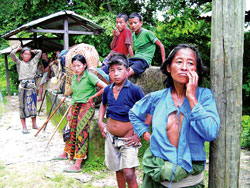 It was ceasefire that brought Ram Ranjit Yadab home to his family in Gangolia village of Rupendehi after five long years. Now he's fleeing again because of threats from Maoist rebels. His fellow villager Bechu Kunwar is joining Yadab on the path to India.
It was ceasefire that brought Ram Ranjit Yadab home to his family in Gangolia village of Rupendehi after five long years. Now he's fleeing again because of threats from Maoist rebels. His fellow villager Bechu Kunwar is joining Yadab on the path to India.
Kunwar agreed to rebel demands to resign from the police force but that didn't satisfy the Maoists, who insisted that he join their military wing. Yadab knows that their threat cannot be taken lightly after he saw his friend and ex-cop Tribeni Tharu shot in cold blood.
"Why is it again the unarmed civilians who have to be victimised," asks Asta Bhuja Chaudhary, former ward chairman and leader of a local Tharu welfare group. Chaudhary was abducted and then slapped in front of all the Tharu villagers in Rupendehi during a public meeting.
It is not just the rebels but also state authorities and vigilante groups who have been terrorising ordinary villagers. As the Maoists intensified their activities, the state also scaled up its search operations. The security forces have harassed and arrested villagers in Rupendehi, Kapilbastu and Nawalparasi when they were unable to provide information about the rebels. Even ordinary rickshaw driver Brijman BK and his fianc? were arrested on the eve of their marriage last week.
Constant announcements by the district administration that anyone resisting arrest during checking would be shot have terrified civilians.
Anti-Maoist vigilante groups, especially in Marya Bajar of Rupendehi, have also launched fresh violence by attacking political workers, burning poor villagers' homes and intimidating locals in the name of flushing out the rebels. The group, led by Santosh Sribastab, extorts about Rs 5,000 from locals, and force families to pay Rs 20,000-30,000 for those working abroad.
"Many are leaving their native homes as they are unable to bear the injustice," says Ramchandra Dhakal, district president of the Nepali Congress in Rupendehi. Political workers and their families have been the worst victims, he added.
Many villagers have already started crossing the border to India. Local NGO workers from Maiti Nepal, which tracks the movement of sex traffickers and their victims in the border area of Bhairawa, have noticed that the flow of Nepali villagers towards India has more than doubled after the ceasefire ended.
"We were forced to quit our schools and are now going to India for our own safety," said a group of young boys who had reached Butwal before moving on to India.
"The Maoists tell us to join their military and the security force intimidate us to give information about the rebels," said Deb Kumar Magar.
But while the forces have extended curfew hours and increased their operations, there is still no sign of the Maoists reducing their military activities. In fact after the ceasefire, the Maoists established a new Fourth Military Division, which has already been mobilised in the Gandak region.
According to Rukum Division Commander Ganesh Pun, a special task force has been assigned to target the town area. It has already attacked custom officials at the key border area of Belhiya, where two police officers were killed and two more seriously injured.
Picture Caption: The poor are always hurt most by the escalating violence. PIC: DAMBER K SHRESTHA


